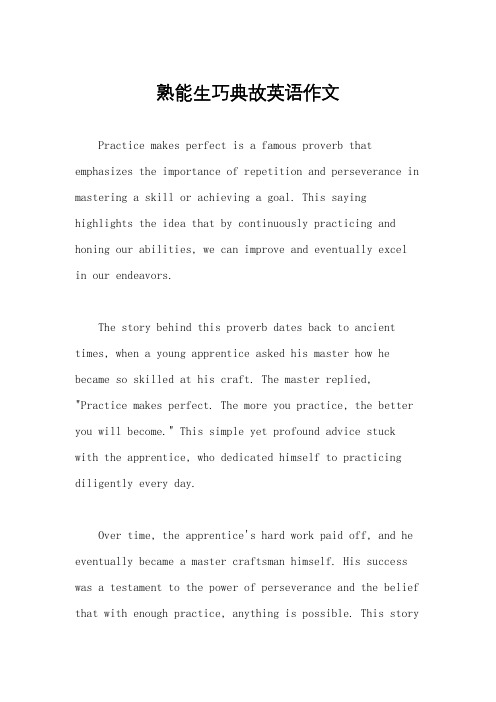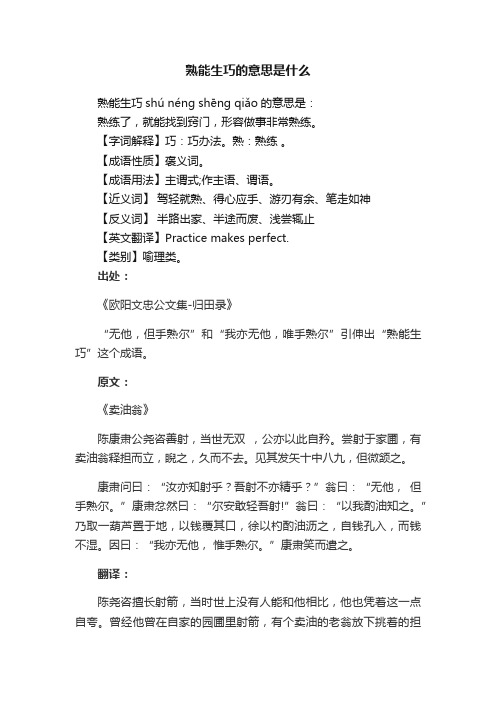中国成语典故--熟能生巧(中英对照)
熟能生巧典故英语作文

熟能生巧典故英语作文Practice makes perfect is a famous proverb that emphasizes the importance of repetition and perseverance in mastering a skill or achieving a goal. This saying highlights the idea that by continuously practicing and honing our abilities, we can improve and eventually excel in our endeavors.The story behind this proverb dates back to ancient times, when a young apprentice asked his master how he became so skilled at his craft. The master replied, "Practice makes perfect. The more you practice, the better you will become." This simple yet profound advice stuck with the apprentice, who dedicated himself to practicing diligently every day.Over time, the apprentice's hard work paid off, and he eventually became a master craftsman himself. His success was a testament to the power of perseverance and the belief that with enough practice, anything is possible. This storyhas since been passed down through generations as a reminder that consistent effort and dedication are key to achieving excellence.In today's fast-paced world, the saying "practice makes perfect" still holds true. Whether it's learning a new skill, mastering a sport, or excelling in a profession, putting in the time and effort to practice is essential for success. By embracing this principle and committing to continuous improvement, we can overcome challenges, reach our full potential, and ultimately achieve our goals.。
成语熟能生巧的故事

成语熟能生巧的故事熟能生巧是指熟练了,就能找到窍门。
你知道熟能生巧的成语故事吗?下面请欣赏店铺给大家带来的成语熟能生巧的故事相关内容,大家一起来学习一下吧。
成语熟能生巧的故事秦国的名将白起,领兵前去攻打魏国。
有个名叫苏厉的谋士获悉后,赶紧去见周朝的国君,提醒他说:“如果魏国被秦军占领,您的处境就危险了。
”原来,这时周朝的国君名义上是天子,实际上对各诸侯国已没有管辖权。
魏国如被秦国攻灭,秦国的势力将更强大,对周天子的威胁也更大。
周天子问苏厉怎么办,苏厉建议周天子赶快派人去劝说白起停止进攻,并给白起讲一个故事。
苏厉介绍了一个应该向白起讲的故事:楚国有个著名的射箭手,名叫养由基。
此人年轻时就勇力过人,练成了一手好箭法。
当时还有一个名叫潘虎的勇士,也擅长射箭。
一天,两人在场地上比试射箭,许多人都围着观看。
靶子设在五十步外,那里撑起一块板,板上有一个红心。
潘虎拉开强弓,一连三箭都正中红心,博得围观的人一片喝采声。
潘虎也洋洋得意地向养由基拱拱手,表示请他指教。
养由基环视一下四周,说:“射五十步外的红心,目标太近、太大了,还是射百步外的柳叶吧!”说罢,他指着百步外的一棵杨柳树,叫人在树上选一片叶子,涂土红色作为靶子。
接着,他拉开弓,“嗖”的一声射去,结果箭镞(zu)正好贯穿在这片杨柳叶的中心。
在场的人都惊呆了。
潘虎自知没有这样高明的本领,但又不相信养由基箭箭都能射穿柳叶,便走到那棵杨柳树下,选择了三片杨柳叶,在上面用颜色编上号,请养由基按编号次序再射。
养由基走前几步,看清了编号,然后退到百步之外,拉开弓,“嗖”、“嗖”、“嗖”三箭,分别射中三片编上号的杨柳叶。
这一来,喝采声雷动,潘虎也口服心服。
就在一片喝采声中,有个人在养由基身旁冷冷地说:“嗯,有了百步穿杨的本领,才可以教他射箭了!”养由基听此人口气这么大,不禁生气地转过身去问道:“你准备怎样教我射箭?”那人平静地说:“我并不是来教你怎样弯弓射箭,而是来提醒你该怎样保持射箭名声的。
熟能生巧成语故事英语作文

熟能生巧成语故事英语作文The Power of Persistent Practice: A Story of Mastering the Art of PerfectionThe journey towards mastering any skill or craft is often paved with challenges, setbacks, and moments of self-doubt. However, for those who are willing to embrace the power of persistent practice, the path to perfection can be both rewarding and transformative. This is the story of how the timeless idiom "practice makes perfect" came to life, inspiring generations to pursue their passions with unwavering dedication.It all began with a young artist named Emma, whose boundless creativity was matched only by her insatiable desire to hone her craft. From a young age, Emma had been captivated by the beauty and complexity of the visual arts, spending countless hours sketching, painting, and experimenting with various mediums. Yet, despite her natural talent, she often found herself frustrated by the imperfections that plagued her work.One day, as Emma was meticulously studying the masterpieces of the great artists who had come before her, she stumbled upon a quote that would change the course of her artistic journey. "Practice makes perfect," it read, a simple yet profound statement that resonated deeply within her. Emma realized that the key to achieving the level of mastery she so ardently sought lay not in the fleeting moments of inspiration, but in the consistent, disciplined effort she was willing to invest.Fueled by this newfound understanding, Emma set out to put the idiom into practice. She began by dedicating herself to a rigorous daily routine, spending hours in her studio, refining her techniques, and pushing the boundaries of her abilities. At times, the task felt overwhelming, and she found herself questioning whether she had what it took to reach the heights of her artistic dreams.But Emma refused to be deterred. She persevered, embracing each setback as an opportunity to learn and grow. Whenever she encountered a challenge, she would break it down into smaller, manageable steps, focusing on incremental progress rather than perfection. Slowly but surely, her skills began to improve, and she found herself able to create works that captured the essence of her vision with greater clarity and precision.As the years passed, Emma's dedication and hard work began to payoff in remarkable ways. Her paintings were increasingly recognized for their technical mastery and emotional depth, earning her acclaim from critics and collectors alike. But more importantly, she had discovered the true power of the idiom "practice makes perfect" –not as a mere platitude, but as a guiding principle that had transformed her life and her art.Emma's story, however, is not just about her personal journey of artistic growth. It is a testament to the universal truth that lies at the heart of the "practice makes perfect" idiom – that with unwavering commitment and consistent effort, any individual can overcome seemingly insurmountable obstacles and achieve remarkable feats.Whether it's mastering a musical instrument, perfecting a foreign language, or honing a professional skill, the principles that guided Emma's path to success can be applied to a wide range of endeavors. By embracing the mindset of continuous improvement, embracing setbacks as opportunities for growth, and maintaining a relentless focus on the process rather than the end result, individuals can unlock their true potential and achieve levels of mastery that were once thought impossible.Of course, the path to perfection is not without its challenges. There will be moments of frustration, self-doubt, and even burnout. But it is in these moments that the true power of the "practice makesperfect" idiom shines through. By persisting in the face of adversity, by refusing to give up in the face of seemingly insurmountable odds, individuals can tap into a well of resilience and determination that can propel them to new heights of excellence.In the end, the story of Emma and the "practice makes perfect" idiom is a powerful reminder that greatness is not the result of innate talent or luck, but rather the product of unwavering dedication and consistent effort. It is a testament to the transformative power of the human spirit, and a testament to the belief that with the right mindset and the willingness to put in the hard work, anything is possible.So, whether you are an aspiring artist, a budding musician, or a driven professional, let the story of Emma and the "practice makes perfect" idiom be your guide. Embrace the journey, celebrate the small victories, and never lose sight of the power of persistent practice. For it is in the pursuit of perfection that we discover the true depths of our own potential, and unlock the boundless possibilities that lie within us all.。
熟能生巧的意思是什么

熟能生巧的意思是什么熟能生巧shú néng shēng qiǎo的意思是:熟练了,就能找到窍门,形容做事非常熟练。
【字词解释】巧:巧办法。
熟:熟练。
【成语性质】褒义词。
【成语用法】主谓式;作主语、谓语。
【近义词】驾轻就熟、得心应手、游刃有余、笔走如神【反义词】半路出家、半途而废、浅尝辄止【英文翻译】Practice makes perfect.【类别】喻理类。
出处:《欧阳文忠公文集-归田录》“无他,但手熟尔”和“我亦无他,唯手熟尔”引伸出“熟能生巧”这个成语。
原文:《卖油翁》陈康肃公尧咨善射,当世无双,公亦以此自矜。
尝射于家圃,有卖油翁释担而立,睨之,久而不去。
见其发矢十中八九,但微颔之。
康肃问曰:“汝亦知射乎?吾射不亦精乎?”翁曰:“无他,但手熟尔。
”康肃忿然曰:“尔安敢轻吾射!”翁曰:“以我酌油知之。
”乃取一葫芦置于地,以钱覆其口,徐以杓酌油沥之,自钱孔入,而钱不湿。
因曰:“我亦无他,惟手熟尔。
”康肃笑而遣之。
翻译:陈尧咨擅长射箭,当时世上没有人能和他相比,他也凭着这一点自夸。
曾经他曾在自家的园圃里射箭,有个卖油的老翁放下挑着的担子,站在一旁,不在意地斜着眼看他,久久地不离去。
老翁见到陈尧咨射出的箭十支能中八九支,他也只不过微微地点点头赞许这情况。
陈尧咨看到了,跑过来问道:“你也会射箭吗?我射箭的本领难道不也很精湛吗?”老翁说:“没有什么别的奥秘,只不过是熟能生巧罢了。
”陈尧咨听后愤愤地说:“你怎么敢轻视我射箭的技术!”老翁说:“凭着我倒油的经验就可知道这个道理。
”于是老翁取过一个葫芦立放在地上,用铜钱盖在它的口上,慢慢地用勺子把油倒进葫芦,油从铜钱的孔中注进去,却不沾湿铜钱。
老人说:“我这点手艺也没有什么别的奥秘,只是熟能生巧罢了。
”陈尧咨见此,只好笑着尴尬地将老翁打发走了。
近义词辨析:得心应手的“得”是得到,想到;应是:反应,配合。
意思是;心里怎么想,手就能怎么做。
熟能生巧英语 熟能生巧的故事的英语翻译

熟能生巧英语熟能生巧的故事的英语翻译各位读友大家好,此文档由网络收集而来,欢迎您下载,谢谢
只有通过实践才能善于做的事情、写流利来,而且在其他各界人士. Only when you do more practice can you make things perfect. Through practice。
这不仅适用于我们的学习。
只有当你做更多的实践你能完美的东西帮楼上翻译一下并改正
There is an old saying in China。
熟能生巧英语
熟能生巧。
实践是一种手段和完善是一个目标。
熟能生巧英语实践使我们能够正确拼写单词. This is true not only in our learning but also in other walks of life.
另一个例子是烹饪。
以英国为例的研究。
一个人要准确流利地说英语没有大量的实践是几乎不
可能的, why not put it into practice,掌握语法规则和惯例也很快使我们他说?
中国有句古话:熟能生巧. Practice enables us to spell words correctly and master the rules of grammar quickly and practice also makes us he come fluent in speaking and writing: Practice makes perfect,这是肯定的。
既然我们已经意识到实践的重要性,为什么不付诸实践呢各位读友大家好,此文档由网络收集而来,欢迎您下载,谢谢。
熟能生巧典故英语作文

熟能生巧典故英语作文Practice Makes Perfect。
The proverb "practice makes perfect" is a well-known saying that emphasizes the importance of perseverance and dedication in achieving success. It means that if you repeatedly practice something, you will eventually become skilled at it.The origin of this proverb can be traced back to ancient China. Legend has it that a famous archer named Houyi wanted to become the best in his craft. He practiced shooting arrows every day until he became so skilled that he could shoot nine arrows at once and hit nine targets simultaneously. This incredible feat earned him the title of "God of Archery."The story of Houyi demonstrates the power of practice and how it can lead to mastery. This principle can be applied to any skill or activity, whether it is sports,music, art, or academics. The more you practice, the better you become.For example, if you want to become a skilled musician, you need to practice playing your instrument every day. You may start out with simple exercises and gradually work your way up to more complex pieces. With consistent practice,you will develop muscle memory and improve your technique, allowing you to play more confidently and expressively.Similarly, if you want to excel in academics, you needto practice studying and reviewing your material regularly. This means setting aside time each day to read, take notes, and review your work. With consistent practice, you will become more knowledgeable and confident in your abilities, which will ultimately lead to success.In conclusion, the proverb "practice makes perfect" isa timeless reminder of the importance of hard work and dedication in achieving success. Whether you are an athlete, musician, artist, or student, the key to mastery isconsistent practice. So keep practicing, and you will eventually reach your goals!。
熟能生巧 中英文对照阅读

熟能生巧中英文对照阅读熟能生巧中文熟能生巧陈尧咨是宋朝人,他很会射箭,每次都能射到红心,所以大家称他神箭手,他认为世界上没有人能比得上他,因此非常骄傲。
有一天,他正在射箭,有一个卖油的走过来,放下担子,斜着眼看他射箭,看了好久,没说甚么,只是微微地点头。
陈尧咨看到卖油的样子,心里有点儿不高兴,就问卖油的说:“你也懂得射箭吗?看我射得多准!”卖油的说:“这没甚么,只是手熟罢了。
”陈尧咨听了,认为卖油的看不起他,就很生气地大声说:“你怎么敢轻视我的箭术呢?”卖油的不说一句话,随手拿出一个葫芦放在地上,用一个方孔的铜钱盖在葫芦口上慢慢地用木杓子装满了油滴下去,只见油从钱孔中滴进去,可是铜钱上面一点儿油也没有沾上,这时卖油的才说:“我这也没甚么,只是熟能生巧罢了。
”熟能生巧英文Practice Makes PerfectChen Yau-tz, of the Sung dynasty (sòng cháo 宋朝), was a very talented archer. He hit the bull's eye every time, and so everyone called him "The Magic Archer." Chen Yau-tz felt that he was the best archer in the world, and so he was very proud.One day, as Chen was shooting arrows, a man selling oil passed by, and stood wat ching him for a long time. "You know something about archery?", Chen Yau-tz aske d the man. "Look at how well I shoot!" The man replied, "That's nothing, all it takes is practice."This made Chen Yau-tz very angry, and he asked, "Dare you underestimate my skill as an archer?" Saying nothing, the man took a bottlenecked gourd, placed it on the ground, and put a coin with a square hole in the center over the top. He poured toi l from a wooden ladle drop-by-drop into the gourd, without spilling a sinle drop on th e coin. The man then turned to Chen Yau-tz and said, "That was also nothing. It's j ust a matter of practice makes perfect."Thus, the meaning of this idiom is that skill comes from repeated practice.。
熟能生巧的成语故事

熟能生巧的成语故事
宋代有个叫陈尧咨的人,射箭技术极为高超,常因此而骄傲。
一天,他正在给大家表演射箭,箭全射中靶心,于是就向旁边卖油的老头吹嘘起来。
然而老人却说:没有什么了不起,只不过是手法熟练而已罢了。
说着,拿来一个葫芦,在葫芦口放上一枚铜钱,用勺子舀了一勺油,高高地举起倒了下去。
倒下去的油像一条线一样穿过钱眼而过,金部流进了葫芦,而铜钱上一点油也没沾上。
老头说:干任何事都一样,熟能生巧。
这个成语指做事熟练了,就会掌握窍门,做得更好。
成语解释:
成语名称:熟能生巧
成语拼音:shú néng shēng qiǎo
成语解释:巧:技巧。
熟练了;就能找到窍门。
典故出处:清李汝珍《镜花缘》第31回:“俗话说的‘熟能生巧’,舅兄昨日读了一夜。
不但他已嚼出此中意味,并且连寄女都听会,所以随问随答,毫不费事。
”
成语例句:要想掌握技术,只有勤学苦练,才能熟能生巧。
- 1、下载文档前请自行甄别文档内容的完整性,平台不提供额外的编辑、内容补充、找答案等附加服务。
- 2、"仅部分预览"的文档,不可在线预览部分如存在完整性等问题,可反馈申请退款(可完整预览的文档不适用该条件!)。
- 3、如文档侵犯您的权益,请联系客服反馈,我们会尽快为您处理(人工客服工作时间:9:00-18:30)。
Practice makes perfect
During the Northern Song Dynasty, there was a skilled archer. One day he drew a big crowd while he was practic ing on the drill ground. He shot so accurately that the on-lookers cheered with excitement. He became very proud of his skill. But amongthe crowd an old oil peddler only nodded his head in differe ntly. This hurt his Pride.
"Ca n you do this?" he asked the old oil peddler.
"No, I ca n't."
"What do you thi nk of my skill?"
"Just OK, but no thi ng special. You've gained your accuracy from persiste nt practice. That's all." 资料个人收集整理,勿做商业用途
"What can you do, the n?"
The old man said no thi ng. He put a gourd bottle on the ground and covered its mouth with a copper coin. He then scooped out a ladle of oil from his big jar, held it high and began to fill the bottle. Now, a thread of oil came down from the ladle into the bottle just through the hole of the coin. Everybody looking on watched with amazement. But the old man said, "This is nothing special, I can do this because I have practiced it a lot." And with these words, he left. 资料个人收集整理,勿做商业用途
Later, people use this phrase to mea n "Practice makes perfect". 资料个人收集整理,勿做商业用途
熟能生巧
北宋时期,有个技艺高超的射手。
有一天,他在训练场上练习射箭,引来了一大群人观看,大家都称赞他的技艺,他感到非常骄傲。
但他发现人群中有个卖油翁
只是淡淡的点点头,这使得他很不高兴。
资料个人收集整理,勿做商业用途
他就问那老头:"你会射箭吗?
"不会
"你认为我的技术如何?"
"一般。
没什么特别的,你只能对付固定的东西,仅此而已
"你会干什么?"
这个老头没有回答。
他把一个葫芦放在地上,接着把一枚铜钱放在瓶口。
然后从他的大油壶里舀起一勺油。
从高处往放在地上的葫芦里倒。
只见那油就像线一样从铜钱中间的小洞里滴下去,一滴都没有漏出来。
围观者都惊呆了。
而这个卖油翁却说:"其实没什么大不了的,只不过是天天练的结果。
"说完,他就离开了。
资料个人收集整理,勿做商业用途
后来,人们用这个成语来表示熟练了就能作得好。
